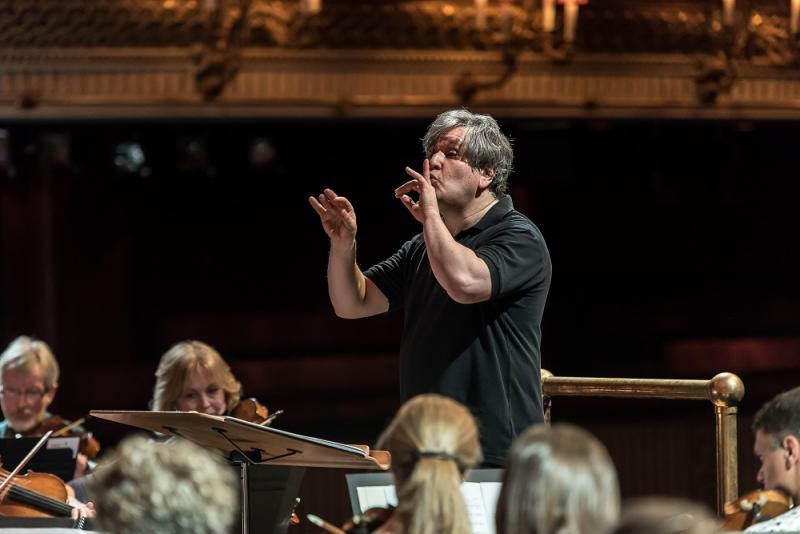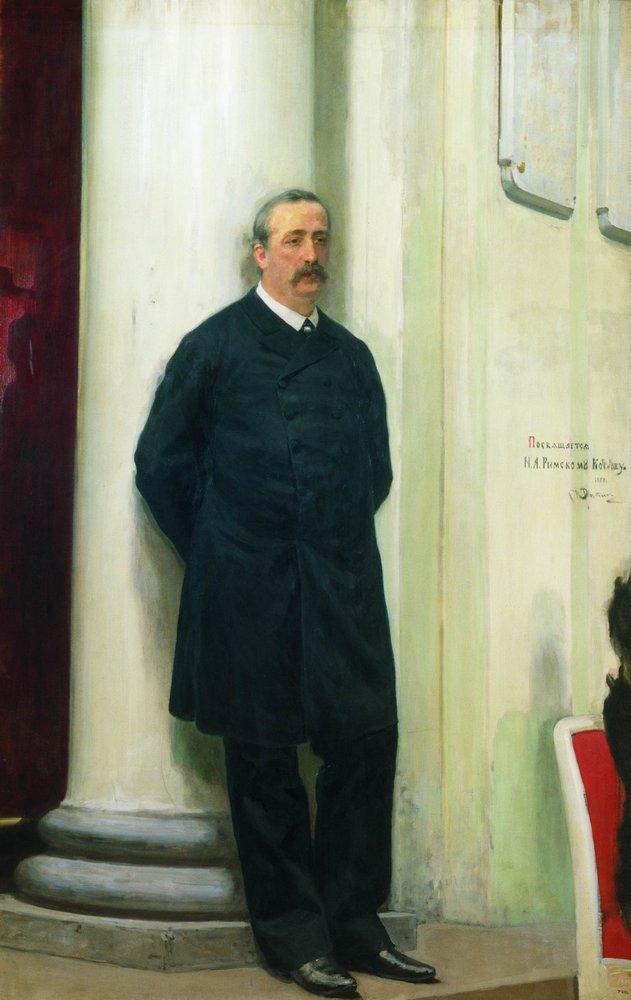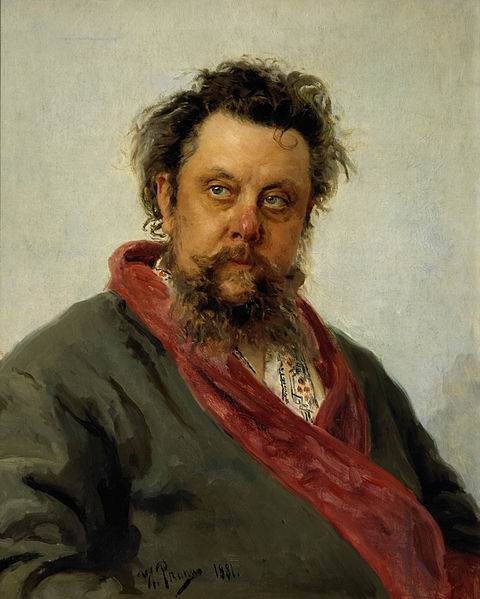The Mighty Handful, ROH Orchestra, Pappano, Royal Opera House | reviews, news & interviews
The Mighty Handful, ROH Orchestra, Pappano, Royal Opera House
The Mighty Handful, ROH Orchestra, Pappano, Royal Opera House
Lively Russian nationalist goody-bag not quite filled to the brim

What fun it must have been to attend any of the St Petersburg Free Music School concerts during the second half of the 19th century.
Balakirev and company might have looked a bit askance at the relatively short measure in the second of Antonio Pappano's annual programmes with his Orchestra of the Royal Opera House, a kind of contextual taster for the forthcoming Boris Godunov, but they would have loved his enthusiasm and energy, which extended to pleasant introductions to both halves of the concert.
 From a feast of colourful scores by "the Five", any number of courses could have been selected. Perhaps the only obvious one on Pappano's menu, apart from the minute-long "Flight of the Bumble-bee" from Rimsky-Korsakov's Tsar Saltan, was Borodin's Second Symphony, the real meat of the evening (the composer pictured right by Ilya Repin). Pappano got the Royal Opera strings to dig deep into the leonine offcuts from Prince Igor; at the other end of the scale, principal clarinet and horn wrought magic at the beginning and end of the bardic song in the slow movement.
From a feast of colourful scores by "the Five", any number of courses could have been selected. Perhaps the only obvious one on Pappano's menu, apart from the minute-long "Flight of the Bumble-bee" from Rimsky-Korsakov's Tsar Saltan, was Borodin's Second Symphony, the real meat of the evening (the composer pictured right by Ilya Repin). Pappano got the Royal Opera strings to dig deep into the leonine offcuts from Prince Igor; at the other end of the scale, principal clarinet and horn wrought magic at the beginning and end of the bardic song in the slow movement.
All the performance lacked was depth to the lyric melodies, both here and in the bird-rich forest and battlefield of Rimsky-Korsakov's Invisible City of Kitezh (we could have done with the wedding balalaika imitations and Straussian apotheosis of the suite from the opera, too). Funny, but I look back with fondness on the heart of dark oak Gergiev used to get in such themes during his heyday at the Mariinsky/Kirov Theatre. But then the Royal Opera House as a concert venue didn't help with warmth or perspective. Enough to make one all the more grateful for the adequate Festival Hall or the Barbican; it's dry and pitiless to the orchestra on the stage, for all the handsome wood surrounds.
For that reason the original, incoherent but exciting romp of Musorgsky's original 1867 St John's Night on Bare Mountain (the composer pictured below by Repin, at the end of his life) came off best. Its bald scoring came across as positively hair-raising, from the first fortissimo skedaddling of the witches – not flying in from a distance as in Rimsky-Korsakov's more familiar 1882 arrangement – to the whole-tone romps of the fierce conclusion. Rimsky arranged it all better as a sequence, of course, but Pappano made a ferocious argument for the rawness of the original.
 An interlude in the short second half came in the shape of the Prelude to Act III of Cui's William Ratcliff. A vocal soloist would have been necessary to give a fair portrait of this once-popular operatic composer – he wrote no less than 15 operas – and all the brief setting-up of love music in the midst of the murderous Scottish mayhem Cui drew from Heine's bloody original was to suggest a heart-on-sleeve kinship with later Italian intermezzos. (Mascagni's Guglielmo Ratcliff, of course, has had an airing; Cui's, never to my knowledge.)
An interlude in the short second half came in the shape of the Prelude to Act III of Cui's William Ratcliff. A vocal soloist would have been necessary to give a fair portrait of this once-popular operatic composer – he wrote no less than 15 operas – and all the brief setting-up of love music in the midst of the murderous Scottish mayhem Cui drew from Heine's bloody original was to suggest a heart-on-sleeve kinship with later Italian intermezzos. (Mascagni's Guglielmo Ratcliff, of course, has had an airing; Cui's, never to my knowledge.)
Fireworks ended the show with Balakirev's giddying oriental fantasy Islamey, exoticism from the fringes of the Russian empire being a key tenet of the Handful's nationalism. Here there might have been a showing of self-orchestrated genius in the shape of the slow-working leader's Overture on Three Russian Themes or symphonic poem Tamara, but Pappano needed no justification for choosing the arrangement of the fiendishly difficult piano piece by his fellow-Italian Casella. Respighi couldn't have done a more coruscating job on it, and if you didn't travel home singing the gorgeous, cor anglais-led oriental melody at the heart of the work as I did, that wouldn't have been the fault of Pappano's brilliant finale.
rating
Share this article
more Classical music
 Bell, Perahia, ASMF Chamber Ensemble, Wigmore Hall review - joy in teamwork
A great pianist re-emerges in Schumann, but Beamish and Mendelssohn take the palm
Bell, Perahia, ASMF Chamber Ensemble, Wigmore Hall review - joy in teamwork
A great pianist re-emerges in Schumann, but Beamish and Mendelssohn take the palm
 First Persons: composers Colin Alexander and Héloïse Werner on fantasy in guided improvisation
On five new works allowing an element of freedom in the performance
First Persons: composers Colin Alexander and Héloïse Werner on fantasy in guided improvisation
On five new works allowing an element of freedom in the performance
 First Person: Leeds Lieder Festival director and pianist Joseph Middleton on a beloved organisation back from the brink
Arts Council funding restored after the blow of 2023, new paths are being forged
First Person: Leeds Lieder Festival director and pianist Joseph Middleton on a beloved organisation back from the brink
Arts Council funding restored after the blow of 2023, new paths are being forged
 Classical CDs: Nymphs, magots and buckgoats
Epic symphonies, popular music from 17th century London and an engrossing tribute to a great Spanish pianist
Classical CDs: Nymphs, magots and buckgoats
Epic symphonies, popular music from 17th century London and an engrossing tribute to a great Spanish pianist
 Sheku Kanneh-Mason, Philharmonia Chorus, RPO, Petrenko, RFH review - poetic cello, blazing chorus
Atmospheric Elgar and Weinberg, but Rachmaninov's 'The Bells' takes the palm
Sheku Kanneh-Mason, Philharmonia Chorus, RPO, Petrenko, RFH review - poetic cello, blazing chorus
Atmospheric Elgar and Weinberg, but Rachmaninov's 'The Bells' takes the palm
 Daphnis et Chloé, Tenebrae, LSO, Pappano, Barbican review - lighting up Ravel’s ‘choreographic symphony’
All details outstanding in the lavish canvas of a giant masterpiece
Daphnis et Chloé, Tenebrae, LSO, Pappano, Barbican review - lighting up Ravel’s ‘choreographic symphony’
All details outstanding in the lavish canvas of a giant masterpiece
 Goldscheider, Spence, Britten Sinfonia, Milton Court review - heroic evening songs and a jolly horn ramble
Direct, cheerful new concerto by Huw Watkins, but the programme didn’t quite cohere
Goldscheider, Spence, Britten Sinfonia, Milton Court review - heroic evening songs and a jolly horn ramble
Direct, cheerful new concerto by Huw Watkins, but the programme didn’t quite cohere
 Marwood, Power, Watkins, Hallé, Adès, Bridgewater Hall, Manchester review - sonic adventure and luxuriance
Premiere of a mesmeric piece from composer Oliver Leith
Marwood, Power, Watkins, Hallé, Adès, Bridgewater Hall, Manchester review - sonic adventure and luxuriance
Premiere of a mesmeric piece from composer Oliver Leith
 Elmore String Quartet, Kings Place review - impressive playing from an emerging group
A new work holds its own alongside acknowledged masterpieces
Elmore String Quartet, Kings Place review - impressive playing from an emerging group
A new work holds its own alongside acknowledged masterpieces
 Gilliver, LSO, Roth, Barbican review - the future is bright
Vivid engagement in fresh works by young British composers, and an orchestra on form
Gilliver, LSO, Roth, Barbican review - the future is bright
Vivid engagement in fresh works by young British composers, and an orchestra on form
 Josefowicz, LPO, Järvi, RFH review - friendly monsters
Mighty but accessible Bruckner from a peerless interpreter
Josefowicz, LPO, Järvi, RFH review - friendly monsters
Mighty but accessible Bruckner from a peerless interpreter
 Cargill, Kantos Chamber Choir, Manchester Camerata, Menezes, Stoller Hall, Manchester review - imagination and star quality
Choral-orchestral collaboration is set for great things
Cargill, Kantos Chamber Choir, Manchester Camerata, Menezes, Stoller Hall, Manchester review - imagination and star quality
Choral-orchestral collaboration is set for great things

Add comment